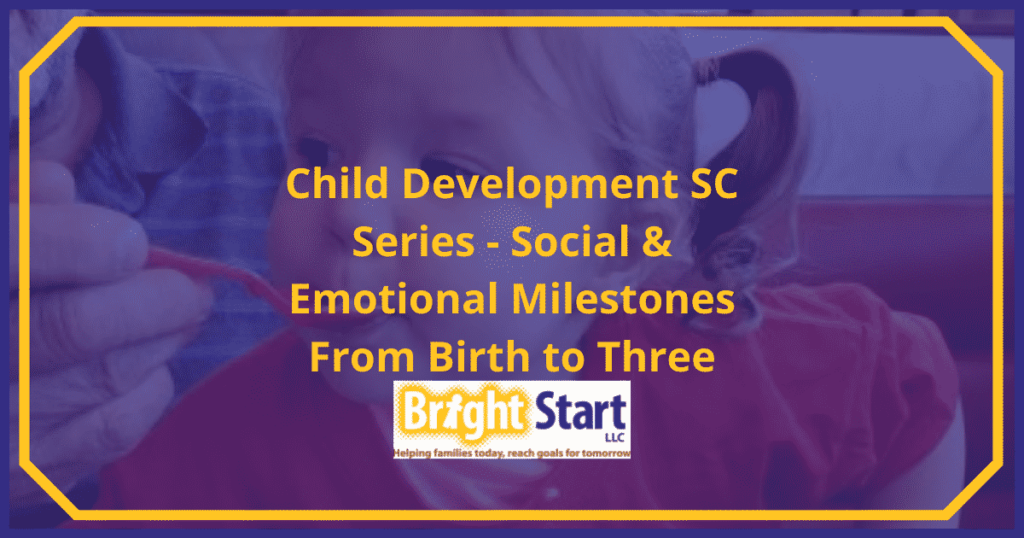
In the first three years of life, your child learns how to engage in social interactions by becoming aware of themselves and their emotions. Social emotional development includes countless important skills, like regulating emotions, communicating respectfully, and learning self-discipline. In this article, we’ll cover what social emotional learning looks like at a young age, with all the important milestones that prepare your child for future social and emotional interactions in school and beyond.
Social Awareness in Babies
From birth to two months, babies will be fascinated with faces, preferring to watch your facial expressions over anything else. Your baby will begin to observe and absorb their environment, including your moods. They’ll respond to your touch, one of the earliest forms of communication, calming when held. You can expect to see your child’s first smile, as well.
Much of social emotional development, at first, is reflecting and mirroring the behaviors of the caregiver. From two to four months, your child will begin to copy your movements and facial expressions. They’ll also learn how to communicate with you in new ways, like crying when playing stops, waving their arms and legs to show that they’re excited, or smiling and laughing. They’re beginning to discover new ways to communicate with you.
Becoming an Individual
By six months your baby will know familiar faces and will respond to other people’s emotions. They’ll also enjoy looking at themselves in the mirror, beginning to understand that they are a little, individual person. Your baby will often be happy at this time, laughing and smiling at people frequently. At nine months, they’ll recognize their family members, while being wary or frightened of strangers and new faces. They’ll also develop likes and dislikes as their unique individuality begins to show; they’ll have favorite toys, songs, rhymes, and people that they love to spend time with.
At twelve months your child will show signs of missing you and their caregivers. They’ll still be shy with strangers, and they might begin to show fear. They’ll also try and get your attention with new sounds. This is a great time to play with your baby to encourage social emotional development—try simple games, like pat-a-cake, that rely on communicating fun patterns and rhymes. Your baby will also continue to form attachments and preferences, likely in the form of a beloved toy.
At eighteen months, your child should be able to recognize themselves in the mirror. With this self-awareness comes a full array of emotions that they won’t fully understand how to regulate. This means they’ll have more temper tantrums as they struggle to communicate and control what they feel. This is a great time to read simple children’s books that explain their emotions to them, so they can become aware of why they feel the way they do. Use their rapidly developing imaginations, as they begin to play pretend, to help them begin the long process of navigating their feelings. Your child will also start to point to things that they want to show you, so it’s a great time to play and engage with them in new ways.
Making Friends
By two years playdates will become an enjoyable part of your life, as your toddler will get excited to see and play with other children. With new friends comes defiance, of course, as they begin to test their boundaries. They’ll also develop their own unique sense of humor and might laugh at unusual things. Don’t worry if they aren’t sharing, however—they’re still learning how to get along with other children. Encourage them to share and make sure to supervise their playdates.
When your child is twenty-seven months old, they’ll be a full-blown individual, with lots of emotions that they have trouble expressing. Routines will be important, especially around naps and bedtime. Keep a schedule that ensures your toddler gets at least twelve hours of sleep and a daily nap. New things that are out of the ordinary, like doctor’s visits or haircuts, might frighten them. They will start demanding their own way with you and their friends, meaning that sharing and socializing with others will still be challenging. If you keep playing with and engaging your child, this will improve by thirty months, when they finally begin to share and play with other children in games like make-believe. Help them practice taking turns with you or their friends. Your toddler will also begin to refer to themselves by their own name.
As your child approaches three years of age, they’ll become stubborn and will often refuse to listen to you. By thirty-three months, however, they’ll have friends and new connections that make it easier for them to separate from you when you drop them off at daycare, preschool, and playdates. You might notice your toddler’s vivid imagination, and some might make up imaginary friends to play with. This is normal, and not at all something to be concerned about. When your child turns three, they’ll take turns and understand ownership, distinguishing between “mine” and “theirs.” They’ll show affection and empathy for their playmates as their emotions become more complex and they continue to develop the self-awareness to express them appropriately.
The Benefits of Early Intervention
The importance of social emotional learning cannot be understated, as it is the foundation for your child’s ability to handle life’s challenges. If your child struggles with social emotional learning, early intervention will ensure that they develop the social skills and self-awareness to lead confident and disciplined lives. Early intervention will decrease the possibility that your child develops depression, anxiety, or more severe behavioral disorders. Intervention will help your child feel that they belong and fit-in with their friends and family, improving their ability to succeed both academically and in their career. Encouraging your child in small ways now can help you avoid large problems later. If there are developmental steps that you feel your child struggles with, reach out to your pediatrician. They can help you decide which program best suits the social emotional needs of your child.
